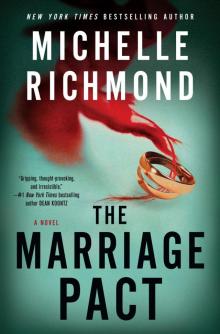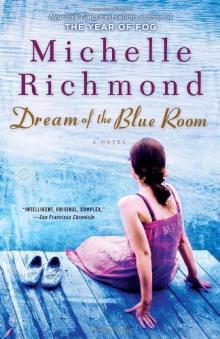- Home
- Michelle Richmond
The Wonder Test Page 4
The Wonder Test Read online
Page 4
But in my first month on the job, I inherited an old espionage case, ten volumes magically appearing in my cubicle at 26 Federal Plaza in Manhattan. Instantly, I was lost in the story, and soon I was absorbed in the investigation. So many interviews, everyone telling his or her version of events, contradicting accounts, hundreds of stories blending together to form the larger narrative, the novel that became the case, the case that turned into a strange adventure. A few months later, another case appeared, then another, and one day I looked up and sixteen years had passed.
Long past lunchtime, I’m still on the back porch reading volume two when I hear another car pull into the driveway. It’s not the American rumble of Kyle’s cruiser but rather a low vibration.
When I walk through the house to the front porch, I see a small man standing at the bottom of the driveway in front of an orange Bentley SUV. He’s wearing pink shorts, pressed and pleated. His white oxford shirt and bow tie look as if they were purchased from the boy’s section at Barneys.
He walks toward me purposefully, hand outstretched. He could be Asian American and forty, South American and fifty, or he could be a small, tanned, midwestern teenager. His entire being is an optical illusion. His face is such an unusual amalgam of heavily edited features, it’s impossible to place. The obvious Botox, chemical peels, cheek implants, and fillers, along with some nipping and tucking around the mouth and eyes and follicle implants at the hairline, only make his face more confusing. The eyes are too flawless, the widow’s peak almost contrived.
“Harris Ojai,” he says, pulling me into a firm, enthusiastic handshake. “Ojai with a j. I sell houses.” His voice is deep, very FM radio, his accent vaguely South African.
“I’m Lina. Thank you, but I already have a house.”
“Ha!” he exclaims, breaking into a huge grin to reveal gleaming white teeth. He reaches into his pocket and pulls out a business card, which he presents to me with two hands. White linen cardstock bearing the words: “Harris Ojai, I sell houses.”
“I understand you inherited this lovely home from your father.”
“I did.”
“I understand you are thinking about selling.”
“Well,” I say, caught off guard. “I haven’t really decided. I suppose I have to move in before I can move out.”
“Decision beats indecision, my friend. When I say I sell houses, I mean I sell houses. Last year in Greenfield, fifty-two houses were sold. Do you know how many of those transactions were shepherded by me and my firm?”
“You tell me.”
“Forty-seven.” Harris makes a flourishing motion with his hand, and the sun reflects off his green diamond ring. I imagine he’s practiced that move in the mirror a few thousand times.
“Impressive.”
“In the last quarter, I did two hundred and eight million dollars in sales volume. I guarantee you a good price. I have overseas buyers.” He leans forward on the word “overseas,” eyes narrowed and gleeful, as if to imply that it has some sort of magic. Then he turns and skitters down the driveway and back into his Bentley.
8
In humans, the HBB gene influences how hemoglobin is made. If someone inherits two of the “s” version of the gene, they develop sickle cell anemia. If someone inherits two of the “S” version, they have a higher susceptibility to malaria. If a new planet had to be colonized, should we send only humans with two of the “S” version, only humans with two of the “s” version, or some of each? Why?
Caroline has a new blue streak in her hair. She’s standing at the curb in front of the school with Rory, wearing baggy chinos, Puma Clydes, and a Patti Smith T-shirt—a reproduction of the iconic cover of Wave. Unsettling. The album’s first line drifts through my mind, “Jesus died for somebody’s sins, but not mine.”
The sight of Patti Smith immediately sends me into a mental funk. Fred was the fifth in line to bear his Christian name, Frederick. In college, I was a huge Patti Smith fan, so when I first met him, her song “Frederick” instantly came to mind. It’s an intoxicating love song, dreamy and loud.
Pulling into the driveway of my dad’s house, I glance at Caroline in the rearview mirror. “Do you like Patti Smith?”
At first, she’s confused, then she realizes I’m referring to the shirt. “Oh this. Sure, she’s a friend of my dad or something.”
“Cool,” Rory says. “Six degrees.”
Caroline frowns. “What does that mean?”
“You haven’t seen the movie?”
“What movie?”
“We’re totally watching Six Degrees of Separation this afternoon,” Rory says.
Rory and Caroline drop their backpacks in the foyer and put a bag of popcorn in the microwave, filling the kitchen with its buttery smell. Then they head upstairs to the movie room. From the kitchen, I watch them race through the breezeway, jostling each other like puppies. I love seeing Rory so happy. I wish Fred were here to see it too.
I sit down at the table with a cup of decaf and return to the file, getting lost in the story once again. It’s dark when Rory goes outside with Caroline to wait for her driver.
“Hot dogs for dinner?” he suggests after she’s gone.
“Absolutely.”
After Fred died, I made a concerted effort to maintain stability in Rory’s life. Every night I came home from work by six and put dinner on the table at seven. I tried dishes I’d never made when the three of us were together—risotto with truffles, delicate white fish in foil with zucchini, even beef bourguignon. It was as though, in the absence of our third party, the anchoring member of our family, I had to up the culinary game.
One night, poking at a burnt pot roast, Rory said, “Mom, I appreciate what you’re trying to do, but since when do you cook? Besides, sitting down to dinner without Dad is too depressing.”
“You have to eat.”
“Yeah, but we don’t have to make it a big ritual.”
Since then, Rory and I have only sat down together for a formal dinner a handful of times. We eat together, yes, but in a haphazard way, with takeout from Panda Express, messy tacos, or crackers and cheese in front of the TV. Am I a bad mother? Am I doing everything wrong? All signs point to yes, but it seems to work for us. Some days, just getting by feels like a major accomplishment.
I push the files to the side and set the hot dogs and condiments on the table, along with a bowl of sliced strawberries and a can of Reddi-wip.
Rory eyes the file box. “What are you reading?”
“Case file.”
He slathers one hot dog with sauerkraut, another with shredded cheese and ketchup. “I thought you were on leave?”
“It’s unofficial. A local policeman brought it by. Officer Kyle? Blond, young. You’ve probably seen him at the school.”
“What’s the case?”
“The boy Caroline was talking about, Gray Stafford.”
“I heard he’d just been at his grandparents’ house in Tahoe.” Rory devours his first hot dog in three bites.
“I’m only halfway through the file, but I don’t think that’s how it ends.”
He takes a swig of Fanta. “You really think he was kidnapped?”
“I don’t think he was with his grandparents.”
“Like, he got nabbed by a pedophile or something?”
“In noncustodial kidnappings of children, unfortunately, that’s the most likely scenario, but his age makes that less likely, and I don’t see any evidence pointing that way.”
Years before we became parents, Fred and I attended a mandatory religious weekend at Yosemite National Park, a hoop we had to jump through in order to get married in the tiny chapel in the valley. The pastor who led the seminar had copious instructions for how we needed to live our lives; most of his advice involved raising children. At the end of the weekend, we decided that when we became parents, we would sim
ply be ourselves. And being ourselves meant we would always tell the truth.
On the day we brought Rory home from the hospital, swaddled in the giraffe-themed blanket, with that tiny blue cap on his fuzzy head, Fred reminded me of the pact we’d made years before. When Rory started asking questions, we agreed, we would answer truthfully. It was easy enough in the beginning, when he was a toddler, then a preschooler, then a kindergartner, asking questions for which we had answers.
But the older he got, of course, the more complicated his questions became. And the answers weren’t always happy or age appropriate, especially where my work was concerned. Although I omitted the classified details, when he asked me a question, I answered as honestly as possible. If he asked follow-up questions, which he usually did, I answered those too.
Now I’m the one with questions. “Do you see Gray around school?”
“Sometimes at lunch, but we’ve never talked.”
“Does he fit in all right?”
“Sure, he has friends. I heard he was super popular before the whole disappearing act.”
“And now?”
“Kids kind of give him space. They don’t make fun of him, nothing like that. It’s not like he sits alone at lunch eating his dandruff, but he’s quiet. He’s always in a group but never involved. Things just happen around him.” Rory shakes the Reddi-wip can, covering his strawberries in whipped cream. “I’m glad you took the case.”
I shake my head. “Didn’t take it, just glancing at the file.”
“Mom, if a kidnapper is on the loose, you have to do something.”
“We can’t be certain there’s a kidnapper.”
“If I disappeared, you’d want someone to get to the bottom of it.”
“You won’t disappear. Anyway, who’s going to deal with this?” I motion to the house around us, which feels colossal and impossible. “The furniture, the books, the dishes, the tools, everything.”
“The house can wait. This is all just stuff. Remember what Tyler Durden said about owning things?”
“What?”
He squirts Reddi-wip directly into his mouth from the can and talks through a mouthful of foam. “Mom, have you been living under a rock?”
“Enlighten me.”
“‘The things you own end up owning you.’ Anyway, you need to work.”
The way he says it, I know he’s not talking about money. He’s talking about me: who I used to be versus who I’ve become. This new, always-around version of Mom who is a shadow of the old, somewhat absent, laser-focused version of Mom.
“I’m not sure I’m ready.”
“You’re beyond ready.”
When Fred died, I thought I could get past the grief by throwing myself into my job. When Rory needed me most, I burrowed into the familiar comfort of sources, meetings, reports. Grief wasn’t in my skill set; the spy game was. I couldn’t solve the problem of Fred’s death, my son’s wrenching sadness, but I could solve cases, recruit sources, work the difficult angles, drawing strength from the tangled complexities where I felt most at home. Work offered a sense of control.
But then I fumbled. Distracted by a grief that, after all, refused to yield to my demands, I made the worst mistake of my career. A major case went sideways. I lost a friend. As abruptly as I had returned to work, I took a self-imposed leave of absence, my confidence truly shaken for the first time.
I know Rory is right. I need to work. I’ve been absent for too long. I’m getting skittish, allowing one day to morph into the next without accomplishing anything. I’ve lost my way. I have to snap out of it.
9
Kierkegaard once said that the Pythagorean theorem could be applied existentially to the problem of Schrödinger’s Cat. Explore.
At four in the morning, a clear voice wakes me from a dead sleep. For a moment I think I might have dreamed it, a trick of the subconscious on that plane just below waking life. But the voice was clear and loud. It sounded like it was coming from inside the room.
“This town sure is strange,” the voice said. “Seems normal, but it isn’t.”
My eyes search for a figure in the darkness, my hand instinctively reaching inside the drawer of the bedside table, fingers curling around the frame of my SIG Sauer. The room is empty. I stop, motionless, listening. Nothing.
I slide out of bed, my socks moving silently across the floor. At the door, I move slowly, slicing the pie, like I learned all those years ago at Quantico, a lesson that never leaves you. A quick glance to see if someone is in the long hallway. Nothing. I move toward Rory’s room. The door is open. Rory is sound asleep, breathing quietly. I look in the adjoining bathroom, the closet. I feel a bit ridiculous now, but I’m still on high alert.
Here’s the thing: I don’t hear voices in my sleep. I never have.
“Seems normal, but it isn’t.” The words were clear, unmistakable.
I move through the rest of the house. The enormity of the place unsettles me. Truth be told, I felt safer in our small New York apartment, despite the crazy upstairs neighbor. I tiptoe through the breezeway, my neck prickling. Moonlight pouring through the glass walls makes me feel exposed. In the foyer, I edge behind the door and glance out the window.
In the middle of the driveway, a big gray cat with a white throat and paws sits on his hind legs, gazing straight at me.
I have a strange thought: it was the cat who spoke those words to me in my sleep. “This town sure is strange.” I relax, chuckling, unnerved. I lower the gun and stare at the cat for several seconds, a full minute. He doesn’t budge. I have to go back to bed. I need to sleep.
At the stairs, I glance back, only to discover he’s still staring at me. It freaks me out. He looks familiar.
I peek in Rory’s room. He hasn’t moved. I listen for the steady rise and fall of his breath, just as I did when he was a baby—still relieved to hear it after all these years. The room has a tangy teenage smell—vinegar and sweat. I sit in the plush chair in the corner, holding the SIG Sauer in my lap. I watch my boy—at fifteen, still a sweet, angelic child in his sleep.
The next morning, while we’re eating cereal in the kitchen, I say to Rory, “I think Mister Fancy was in our driveway last night.”
Rory has his spoon in one hand, his iPhone in the other, scrolling.
“I think he spoke to me in my dreams.”
Rory glances up from his phone. “What did he say?”
“He said, ‘This town sure is strange. Seems normal, but it isn’t.’”
“He’s right about that,” Rory mumbles. I love that about him. He has no functional constraints; he is open to all possibilities. Most adults have a fully formed idea of exactly how the world is; we’re so quick to dismiss any detail that doesn’t fit into our understanding or our expectations. Not so with Rory. Once, when I confided to him that I’d sensed Fred’s presence after he died—not in a general way but at a precise moment, in the room with me—Rory replied, “Yeah, he does that.”
“Does what?” I asked.
“Stops by.”
10
Genetically modified fruit will either save or destroy the planet. What makes this statement true, false, or irrelevant?
GRAY STAFFORD
Volume 3, page 6
Subject: Jennifer Delacroix
Interviewer: Officer Kyle Ramsey
Date: December 17, 2018
At 10:30 a.m. on December 1, an interview was conducted with Jennifer Delacroix at her place of residence, 120 Pepper Court, Greenfield, California. Mrs. Delacroix was made aware of the identity of the interviewer and the purpose for the interview: to discuss the disappearance of Mrs. Delacroix’s neighbor, Gray Stafford.
Mrs. Delacroix advised that her home backs up to property owned by Bill and Lacey Stafford. The Delacroix and Staffords have been neighbors for five years and nine months. Prior to that, the Delacroi
x family lived in a home three blocks west on Cedar Avenue. As the properties in this area are all one acre or more, the Delacroix do not have much interaction with their neighbors. Mrs. Delacroix did indicate that the Staffords’ two chickens, Helga and Heloise, once got loose in her yard. Heloise was killed by the Delacroix dog, Gunter, but the Staffords seemed to harbor no resentment. The Staffords have since repaired the fence. In the months since the chicken incident, Mrs. Delacroix occasionally finds a container with fresh eggs on her porch.
Mrs. Delacroix indicated that Gray Stafford was rambunctious and prone to distraction. Maisie Delacroix, one of the top students in her junior class, tutored her younger peers three times a week during Enrichment Hour. In this capacity, she had been assigned on occasion to help Gray Stafford prepare for the Wonder Test. His most challenging subject areas were Analogies, Future Functionalities, and typing. By the middle of his tenth-grade year, he was typing at a speed of only 67 words per minute, and Gray’s school adviser was concerned that his poor typing skills would negatively impact his performance on the test.
What Gray lacked in academic prowess, he compensated for in athleticism. Dickie Delacroix, Maisie’s brother, was on an all-star baseball team with Gray Stafford last season. Although Gray was a year younger, he was athletically advanced for his age and was their starting pitcher. The coach was Ron McCrory, who could vouch for Gray’s exceptional skills on the mound.
I’ve just flipped the page to the Ron McCrory interview when I hear Officer Kyle’s cruiser pull up. My dad taught me that every car has its own distinctive sound, like a fingerprint. The make and the model have a lot to do with it, of course, but it goes beyond that, down to the specific vehicle, the maintenance schedule, the anomalies in its exhaust, the way its tires and weight, its own personal history, respond to a particular surface at a particular speed. My father taught me how to listen for a car’s “voice.”

 The Wonder Test
The Wonder Test The Year of Fog
The Year of Fog The Marriage Pact
The Marriage Pact Golden State
Golden State Dream of the Blue Room
Dream of the Blue Room No One You Know
No One You Know